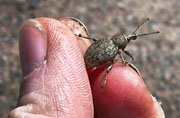 Ithaca, NY; February 27, 2018. Northern New York farmers interested in protecting their alfalfa crops from the devastating alfalfa snout beetle can take advantage of discounts from the Cornell University laboratory raising the biocontrol nematodes that have been proven to reduce not only populations of snout beetle, but other crop pests as well.
Ithaca, NY; February 27, 2018. Northern New York farmers interested in protecting their alfalfa crops from the devastating alfalfa snout beetle can take advantage of discounts from the Cornell University laboratory raising the biocontrol nematodes that have been proven to reduce not only populations of snout beetle, but other crop pests as well.
Research funded long-term by the farmer-driven Northern New York Agricultural Development Program developed the science needed to pioneer the use of native nematodes, tiny insect-attack worms, as a biocontrol to suppress the spread of the destructive insect.
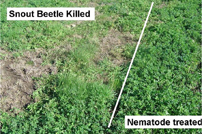 Recent field trials funded by the Northern New York Agricultural Development Program indicate that the biocontrol nematodes are also having an impact on corn rootworm after a field treated with the nematodes is rotated from alfalfa into corn.
Recent field trials funded by the Northern New York Agricultural Development Program indicate that the biocontrol nematodes are also having an impact on corn rootworm after a field treated with the nematodes is rotated from alfalfa into corn.
Research elsewhere in the state has shown the biocontrol nematodes can reduce white grub and wireworm populations.
It requires three to five years to totally inoculate a farm with nematodes to reduce the snout beetle populations to a manageable level.

Cornell entomologist Dr. Elson Shields and Research Support Specialist Antonio Testa who developed the protocol for the use and rearing of the biocontrol nematodes recommend application on alfalfa fields in their seeding year or first production year for best results. Based on recent research trials, application can also be made to cornfields.
The Shields Lab at Cornell University that has reared the biocontrol nematodes as part of its research mandate is offering a discount for orders placed for delivery by June 15 for application within the following 3 to 5 days. This advance order deadline is April 28 and an additional ten percent applies for payment in advance or on delivery.
After the April 28 deadline, a ten percent discount applies to any order paid upon delivery. Farmers must contact the lab at no later than 45 days prior to a planned application based on their 2018 alfalfa cutting schedule.
Biocontrol nematode application must be made before September 15.
The cost is $28 per acre before discount.
The Shields’ Lab will only be providing the nematodes through 2021, opening an opportunity for business development to continue to supply the biocontrol nematodes to area farmers. While one nematode rearing business has been developed as a result of this research, others are needed. The Shields’ Lab will assist individuals seriously interested in rearing the biocontrol nematodes as a business.
Farmers who wish to rear their own biocontrol nematodes may also contact the Shields’ Lab for assistance.
For more information, contact Antonio Testa of the Shields’ Lab at 607-591-1493, at28@cornell.edu, or call Cornell Cooperative Extension NNY Field Crops Specialists Mike Hunter, 315-788-8602, or Kitty O’Neil, 315-853-1218.
Funding for the Northern New York Agricultural Development Program is supported by the New York State Senate and administered by the New York State Department of Agriculture and Markets. Learn more at www.nnyagdev.org.
Alfalfa snout beetle is known to exist across the six northernmost counties of New York State, in Oswego, Cayuga, and Wayne counties in NY, and in southeastern Ontario, Canada. The beetle can destroy entire fields of alfalfa in one growing season. The use of the nematode biocontrol developed in Northern New York is now being trialed in several U.S. states.
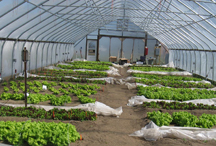
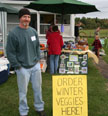 On Saturday, March 24, Ivy will lead a “Growing Vegetables to Sell in Northern New York” workshop for those already commercially growing vegetables and those considering expanding their vegetable production to commercial scale. She will focus on growing vegetables in the spring and fall seasons in spite of the cold climate of Northern New York. The discussion will include using high and low tunnels and row covers.
On Saturday, March 24, Ivy will lead a “Growing Vegetables to Sell in Northern New York” workshop for those already commercially growing vegetables and those considering expanding their vegetable production to commercial scale. She will focus on growing vegetables in the spring and fall seasons in spite of the cold climate of Northern New York. The discussion will include using high and low tunnels and row covers. Northern N.Y. The farmer-driven Northern New York Agricultural Development Program has posted its annual report at
Northern N.Y. The farmer-driven Northern New York Agricultural Development Program has posted its annual report at 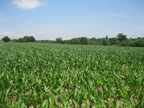 Cornell University Nutrient Management Program Director Dr. Quirine M. Ketterings is cited in the report crediting the farmers and farm advisers in Northern New York as “the frontrunners” prompting re-evaluation of the Cornell corn production guidelines. The farmers who prioritize and select projects for Northern New York Agricultural Development Program funding requested research into how advances in corn breeding and production practices are impacting crop yield and whether it was time to update the associated nitrogen application guidelines for agronomic and economic efficiency.
Cornell University Nutrient Management Program Director Dr. Quirine M. Ketterings is cited in the report crediting the farmers and farm advisers in Northern New York as “the frontrunners” prompting re-evaluation of the Cornell corn production guidelines. The farmers who prioritize and select projects for Northern New York Agricultural Development Program funding requested research into how advances in corn breeding and production practices are impacting crop yield and whether it was time to update the associated nitrogen application guidelines for agronomic and economic efficiency.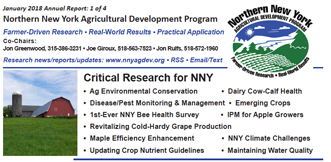
 Northern N.Y.; December 12, 2017. Research funded by the farmer-driven Northern New York Agricultural Development Program is helping regional dairies reduce the risk of winter-related mastitis.
Northern N.Y.; December 12, 2017. Research funded by the farmer-driven Northern New York Agricultural Development Program is helping regional dairies reduce the risk of winter-related mastitis.